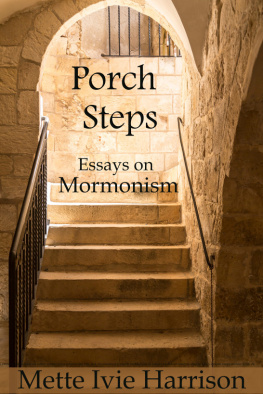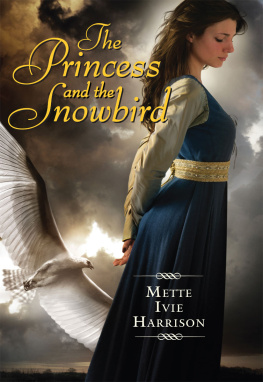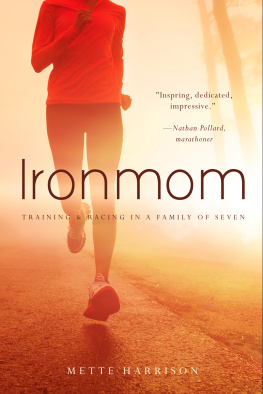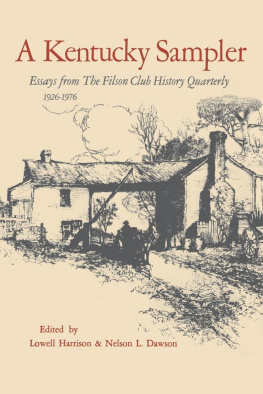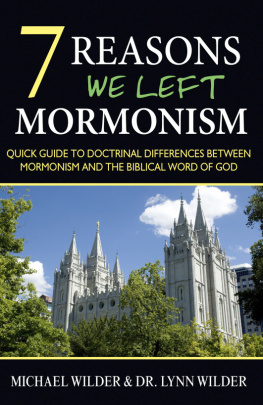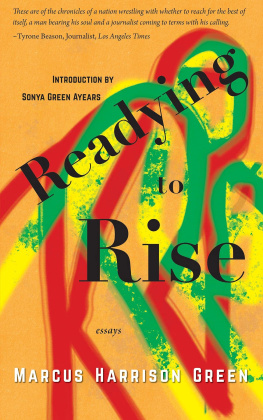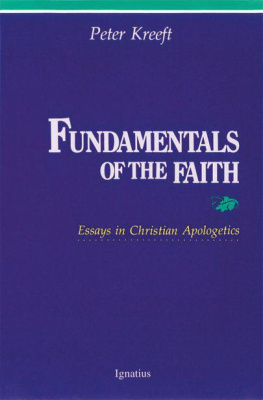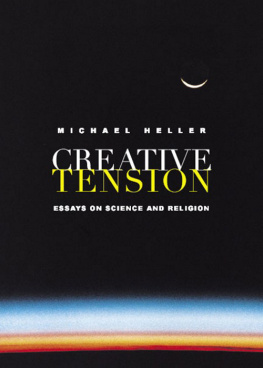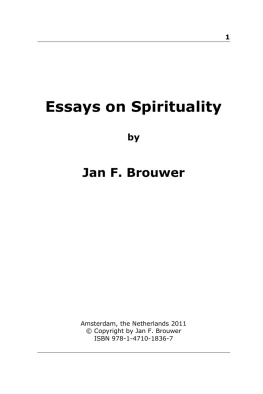Mette Ivie Harrison - Porch Steps: Essays on Mormonism
Here you can read online Mette Ivie Harrison - Porch Steps: Essays on Mormonism full text of the book (entire story) in english for free. Download pdf and epub, get meaning, cover and reviews about this ebook. year: 2019, publisher: Mette Ivie Harrison, genre: Religion. Description of the work, (preface) as well as reviews are available. Best literature library LitArk.com created for fans of good reading and offers a wide selection of genres:
Romance novel
Science fiction
Adventure
Detective
Science
History
Home and family
Prose
Art
Politics
Computer
Non-fiction
Religion
Business
Children
Humor
Choose a favorite category and find really read worthwhile books. Enjoy immersion in the world of imagination, feel the emotions of the characters or learn something new for yourself, make an fascinating discovery.
- Book:Porch Steps: Essays on Mormonism
- Author:
- Publisher:Mette Ivie Harrison
- Genre:
- Year:2019
- Rating:5 / 5
- Favourites:Add to favourites
- Your mark:
- 100
- 1
- 2
- 3
- 4
- 5
Porch Steps: Essays on Mormonism: summary, description and annotation
We offer to read an annotation, description, summary or preface (depends on what the author of the book "Porch Steps: Essays on Mormonism" wrote himself). If you haven't found the necessary information about the book — write in the comments, we will try to find it.
After a faith crisis in 2006 and nearly 8 years as an atheist, I've come back to Mormonismon a slant. These essays talk about the way I see God now, the way I practice spirituality, and the tension that comes in living in a high demands religion.
Porch Steps: Essays on Mormonism — read online for free the complete book (whole text) full work
Below is the text of the book, divided by pages. System saving the place of the last page read, allows you to conveniently read the book "Porch Steps: Essays on Mormonism" online for free, without having to search again every time where you left off. Put a bookmark, and you can go to the page where you finished reading at any time.
Font size:
Interval:
Bookmark:
Porch Steps:
Essays on Mormonism
by: Mette Ivie Harrison
New essays are found first. Olderessays are behind those.
Why It Hurts
The emails and blog comments I get fromnon-Mormons never hurt as much as the ones from Mormons. I supposethats to be expected. Evangelicals loudly proclaiming that Mormonsarent *really* Christians and that they used to be Mormon beforethey accepted Jesus as their savior, or atheists telling me thatIm an apologist for a cult and that Im as guilty as any Mormon isfor whatever terrible ills the church has done, from politicalmaneuverings to make the church more powerful and wealthier tosexual abuse by leadership that has been swept under the rug to themisuse of tithing funds. These are critiques I take instride.
I spent my early years (until age ten)in New Jersey. I knew what people thought of Mormons. Id heard theonly half-joking remarks about horns. I also knew that most peoplethought my father had a half dozen wives whod produced the elevenchildren in our family. Id heard snide remarks about birth controlbefore I even knew about the mechanics of sex. I grew up withenough defensiveness about my Mormonism that when I went back tograduate school at Princeton (after getting a B.A. and M.A. fromBYU), I was careful about who knew I was Mormon. I remember oneprofessor who made a comment about religion being the number oneoppressor of women and I just sat back and kept my mouth shut aboutmy being Mormon. It was obvious that in graduate school, theassumption was that anyone intelligent enough to get in had alreadygiven up the ridiculous idea of any god, let alone organizedreligion.
I moved back to Utah and taught at BYUfor a few years after committing the unpardonable sin of gettingpregnant while in graduate schoolon purpose, no less. But when Ipublished my first novel, The Monster In Me, which was set in Utah,I made very sure that I never used the word Mormon to describethe foster family in the book and that the prayers they spoke aloudwere only vaguely Christian, not specifically Mormon. I didnt wantto be labeled as the Mormon writer by New York publishing, and Iwas very proud of the fact that I hadnt let go of my dream to bepublished nationally rather than being published by a local, Mormonpress.
After The Monster In Me, I wrote sixfantasy novels, precisely because they allowed me to disguise anymessages in fantasy word terms, and any talk of belief or faithbecame magical and therefore couldnt be used against me as areligious person. I was during this time period an extremelyactive, orthodox Mormon who served as a member of the PrimaryPresidency twice, visit taught every month, and had strict rulesfor my kids about modesty, language, and performance at school. Itwas only when I went through a long suicidal depression followingthe death of my sixth child that I began to think about my ownrelationship with God and my Mormonism differently.
In 2012, I did the very scary thing ofwriting a book directly about Mormonism. My national agent at thetime, very much not religious, told me not to write it because noone would ever want to read about Mormons. This somehow gave me thecover I needed to write the book I wanted to read, about a womanwhose Mormonism wasnt orthodox, but who had a firm belief in Godand in herselfa woman I wished I could someday be. The book endedup being published by a national press (Soho) and received greatnational reviews, became a national bestsellerand remains largelyunread by the Mormon public, in part because Deseret Book chose notto carry it in stores.
This early rejection of my book by thetypical Mormon bookstore should have been a warning to me about howI personally would be received by Mormons ever afterward. I worriedover it, but pushed aside the worries and told myself I was strongenough to get through it. I also believed strongly that my familyand friends knew me well enough that they would never turn theirbacks on me. In hindsight, these assumptions seem ratherPollyanna-ish. I know that many Mormons feel that Ive turnedtraitor (at least by the strict terms of loyalty that are often setinside the church) and that therefore I deserve the worst sort ofrejection and even excommunication that I may receive. And yet I amsurprised and hurt every time I get an email from a Mormon thatattacks me on a personal level, telling me that Im going to hell,that God hates me, that Im a demon or any other such overblownrhetoric.
Ive used various methods to deal withthe criticism, including creating a list of four kinds of nastyletters that come from Mormons, because the themes are repeatedconstantly (#1 you hate men #2 you think youre too smart for thechurch #3 you never had real faith #4 youve rejected yourcovenants and deserve to be shunned). But the problem is that Ivebegun to hear these emails in the voices of friends and familymembers who have rejected me on various levels.
Yes, I know that the best thing aboutMormonism is the community and that Im seen now as one who exposesthe problems in the community and therefore no longer deserve to beprotected by the community itself. But I still attend churchweekly. I still teach the Sunbeam class. I am trying to remainMormon in ways that I feel are authentic and which adhere to my ownmoral principlesironically an edict that I learned from Mormonismitself. There are many ways in which I feel like Ive become thewoman that my girlhood version of myself was taught to be. I dowhat is right, let the consequence follow. I have prayed to Godand asked what I should do, and that is to stand up for those whoare marginalized and treated badly as Jesus showed us the exampleof. I give of my time and money to worthy causes and I also doservice in my own community.
But none of this excuses me forspeaking about Mormonism in a way that is deemed disloyal andinappropriate from a woman. I cannot apologize for who I am, thoughthere is some serious irony here. I probably wont stop writingabout Mormonism, but I find myself moving away from it more andmore in my heart largely because of the responses of other Mormons.And I suppose this is what they want, and maybe I shouldnt give itto them purely out of spite. But really, how can I continue to beMormon when Im told over and over again that Im not allowed inthe community anymore unless I conform to rules that make no senseto me or feel wrong? I thought I cared little enough about whatother people thought of me, but my relationship with God is notsuffering, only my relationship with Mormons. They dont want meanymore.
What is God to Me?
A friend recently told me that as longas I believed in Christ, I was welcome in Mormonism. When I said Iwasnt sure I believed in Christ the way that she meant (a literalChrist who was the son of God whose atonement and death mean thatwe will be freed from sin and resurrected), she said that as longas I believed in God, then, I was fine. I also wasnt sure Ibelieved in the God she believes in, who can and will alter theplan of the universe because of our prayers, who performs miraclesfor the righteous, who demands our worship and requires us toperform certain tasks in order to get rewards. So what kind of aGod do I believe in?
Quite simply, a god of love.
I dont know that I believe that God isa manor a woman. Though I do find it useful sometimes to pictureGod as a woman, who puts her hands on mine as we both turn clayinto pottery and she whispers in my ear that the reason weremaking this vessel is because it needs to be filled with somethingvery valuable, something spiritual, that only I can pour into it.Other times, I find God appearing in my prayer as two parents, maleand female. Rarely, God appears to me as a gay man or a black womanor an indigenous person. Sometimes God speaks to me in the form ofa tree, a river, a bridge, or a beautiful piece of art.
Growing up Mormon, I was taught thatthe Catholic idea of God as an unformed spirit was just wrong andeven ridiculous. How could we be children of God if God wasnt evenhuman? But there are just so many problems with the Mormonconception of God for me now. Why is God always depicted as white?Why do we never talk about or pray to Heavenly Mother, if oneexists? Do we still believe in a heaven filled with multiplepolygamous mothers of spiritual children? And what about the ideathat we will also have our own planets to one day rule? I love theway in which Mormonism taught me as a child to look for the divinewithin myself. As an adult, Im less comfortable with the Mormoninsistence that God is male and heterosexual, and that thecelestial kingdom will be a place much like the temple here onearth. Call me a heretic, but the temple, with its reiteratedrituals and focus on genealogical records, is not my idea of agreat way to spend eternity.
Next pageFont size:
Interval:
Bookmark:
Similar books «Porch Steps: Essays on Mormonism»
Look at similar books to Porch Steps: Essays on Mormonism. We have selected literature similar in name and meaning in the hope of providing readers with more options to find new, interesting, not yet read works.
Discussion, reviews of the book Porch Steps: Essays on Mormonism and just readers' own opinions. Leave your comments, write what you think about the work, its meaning or the main characters. Specify what exactly you liked and what you didn't like, and why you think so.

